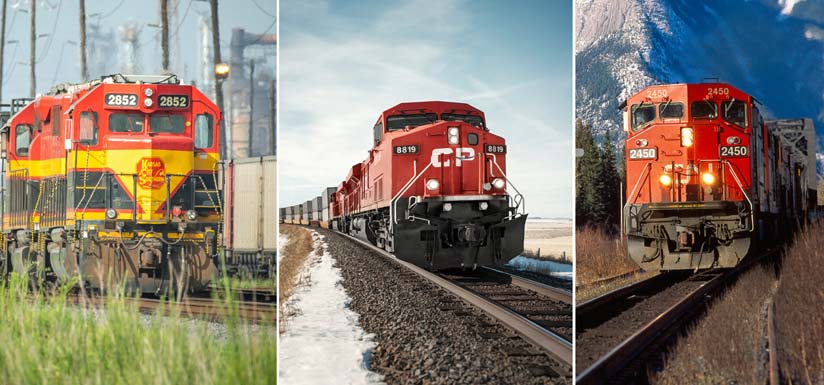
North America - Rail stakeholders and observers are weighing in on how competing attempts by CP and CN to merge with KCS might affect the
freight rail industry.
Both CN and CP are seeking to acquire KCS.
CP and KCS had announced in March plans to merge, prior to CN announcing in April that it is also interested in acquiring KCS.
CP and CN are also both Canadian railways, and each merger proposal with KCS would create a railroad that has operations across Canada, the U.S. Midwest, and
into Mexico.
Here are two viewpoints, both of which note that regulators will need to define what is in the public interest:
Allied Rail Unions warn STB about KCS merger effects
Four rail labor unions have joined forces to express concerns to the Surface Transportation Board (STB) that the high price tag paid to acquire KCS could
result in attempts to drive down labor costs post-merger.
STB is the regulatory body responsible for reviewing rail mergers.
The groups, the Brotherhood of Maintenance of Way Employes Division of the Teamsters union, the Brotherhood of Railroad Signalmen, the International
Association of Sheet Metal, Air, Rail, and Transportation Workers Mechanical Division, and National Conference of Firemen and Oilers 32BJ/SEIU, have formed
into one organization, the Allied Rail Unions.
They are jointly stressing to STB its responsibility to view any acquisition of KCS in light of the public interest, including shippers and those who work for
the respective railroads.
The board's responsibility may run contrary to the wishes of KCS shareholders, who may be seeking the highest price for their shares, the group
said.
"The Board should make it clear that its assessment of whether a proposed acquisition of KCS is in the public interest will turn in part on evaluation of
the purchase price and any premium paid.
The Board should also make it clear that just because the applicants have invested time and money in bringing forward an application, financial markets like
the transaction, and they have lined up supporters, that will not be sufficient to gain approval of the transaction," the group said.
"And the Board should declare that it will not approve plans for cost-cutting and so-called rationalizations that appear to be driven by a desire to
recoup overpayment for control of KCS, and it will not approve a bid when the transportation value of the proposed transaction has been diminished by
overpayment that has resulted from corporate one-upmanship to obtain advantage in a rivalry," it continued.
Allied Rail Unions also raised concerns about a potential bidding war between CN and CP, given CN's revised offer that KCS labeled "superior" last
week.
As an example, the group pointed to how CSX and Norfolk Southern (NS) underwent a bidding war to acquire Conrail.
The struggle resolved when the STB chair at the time brokered a deal in which Conrail's ownership was split between CSX and NS.
But the acquisition also led CSX and NS to reduce labor costs to recoup acquisition costs, the labor group argued.
"A bidding war has consequences. By overpaying to keep the target out of the hands of its rival, the successful bidder would have less capital to invest
in the ultimate railroad, every dollar spent wooing shareholders of the target is a dollar not invested in the railroad," the union group
said.
"The successful bidder, having spent more than what was anticipated, would likely seek to recoup its excess expenditures by seeking so-called
cost-cutting "efficiencies" from rail workers, and it would likely seek to reduce other costs, which in turn, would diminish
service."
CP indicated on Thursday that it will not counter CN's revised merger offer.
CN Must Convince STB the Merger Has Public Benefits
Investment banking firm Cowen recently conducted a call with an unnamed transportation attorney over the ongoing attempts by CN and CP to acquire KCS in light
of recent STB actions.
During the call, Cowen and the attorney discussed STB's actions on Monday, when STB denied CN's request to form a voting trust as part of the process to
acquire KCS.
The board had approved a similar request by CP in early May.
The board's denial comes amid competition concerns over a stretch of parallel CN and KCS networks in Louisiana and CN's larger size by revenue.
"The STB decision on Monday indicates more caution surrounding voting trusts, CN must show that the trust keeps a level playing field.
The key for CN will be that public benefits outweigh harms," said a Thursday note from transportation analyst Jason Seidl.
Seidl and the transportation attorney noted that STB is taking a cautious approach to voting trusts, so it can carry out its statutory responsibilities and
ensure careful consideration of downstream impacts.
"The STB must think about downstream effects, this is important because CP has implied that it will look to acquire another railroad if the CN/KCS merger
goes through, resulting in more consolidation," the note said.
"The STB stated that under the current rules, they must address the competitive impacts the deal offers, and will need to do the analysis to be able to
deny the merger. We must watch and see if any concerned parties make this argument during public comment periods such as shipping associations and other Class
Is."
The board must also consider the public harm pertaining to CN and KCS, including financial harm for CN should the voting trust go through, the note
said.
"From the STB's viewpoint, optionality is also important (with multiple bids for KSU), and they want to make sure they are free to view the deal without
having to tie their hands with an all or nothing scenario," the note said.
If STB blocks CN's voting trust, CN could appeal it, and the case would go to a court of appeals, according to the note.
Joanna Marsh.
(because there was no image with original article)
(usually because it's been seen before)
provisions in Section 29 of the Canadian
Copyright Modernization Act.
